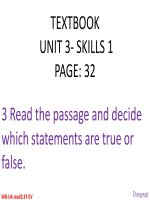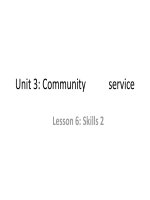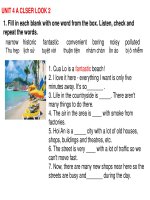Unit 09 3 cities of the world lesson 3 a closer look 2 kho tài liệu học tiếng anh
Bạn đang xem bản rút gọn của tài liệu. Xem và tải ngay bản đầy đủ của tài liệu tại đây (1.17 MB, 43 trang )
August 21, 2017
By: Le Viet Phu
Complete the sentences using the
superlative form of the adjectives given.
1. That is ……………….. traffic I have ever seen!.
(heavy)
2. Nga is …………………..….. student in my class.
(intelligent)
3. March is ………………. month in Vietnam. (hot)
4. Everest is ………………. mountain in the world.
(high)
5. She is ……………………….….. woman I have
ever met. (fascinating)
Complete the sentences using the
superlative form of the adjectives given.
the heaviest traffic I have ever seen!.
1. That is ………………..
(heavy)
most intelligent student in my class.
2. Nga is the
…………………..…..
(intelligent)
the hottest month in Vietnam. (hot)
3. March is ……………….
the highest mountain in the world.
4. Everest is ……………….
(high)
the most fascinating woman I have
5. She is ……………………….…..
ever met. (fascinating)
NEW LESSON
The present perfect
Look at these examples:
(+) I have just seen Nam at the library.
She has gone to Italy twice.
(-) You have NOT sent me the report yet.
Mary has NOT done her homework.
(?) Have you ever played golf?
Has Kathy ever seen David before?
* FORMATION:
(+) S + have / has + PP…
(-) S + have / has + NOT + PP…
(?) Have / Has + S + PP …?
Notes:
S (I / we / you / they) + have
S (he / she / it)
+ has
Have not = haven’t / Has not = hasn’t
PP = Past participle (V-ed / III)
* USES:
1. Diễn tả một hành động vừa mới xảy ra.
Ex: - He has just finished his homework.
- MU has won five games recently.
- They have developed a new product lately.
2. Diễn tả kinh nghiệm sống hoặc việc từng trãi.
Ex: - Minh has gone to Dalat twice.
- Have you ever climbed mount Everest?
- He has never seen a monkey before.
- We have not seen him yet.
- They have already finished their work.
3. Diễn tả một hành động bắt đầu ở quá khứ nhưng
không kết thúc mà vẫn kéo dài cho đến hiện tại, kết
quả ở hiện tại (lúc nói).
Ex: - We have studied English for 6 years.
- Nga has lived in Dalat since 2010.
- They have sold 200 cars so far.
Notes:
* SINCE + MỐC THỜI GIAN
(Kể từ....)
Ex: - They have learnt English SINCE 2009.
- She has changed a lot SINCE she came here.
* FOR + KHOẢNG THỜI GIAN (Được...)
Ex: - We have worked hard FOR 6 months.
- They have learnt English FOR 4 years.
4. Diễn tả một hành động xảy ra trong khoảng thời
gian bây giờ chưa qua
Ex: - I’ve drunk 4 cups of coffee today.
- Have you had a holiday this year?
- We have tried hard this morning.
- Ron hasn’t worked very hard this term.
5. Dùng trong cấu trúc This (It) is the first /
second … time …
Ex: - This is the first time he has driven a car.
- This is the second time Linda has lost her
passport
- It’s the first good meal I’ve had for ages.
THE MARKERS (dấu hiệu nhận biết):
Thì Hiện tại hoàn thành thường đi với các trạng từ sau:
- just, recently, lately.
- already
- ever, never, not…yet, twice, several times,
many times, for a long time (for ages),...
- up to now / so far / until now, hoặc since, for
- today, this morning/afternoon/evening
- (all) this week / month / year / semester
(term) / school year…
- This (It) is the first / second…time
* Practice: Give the correct forms of the verbs.
1. I can’t go with you as I (not finish) _____________
my homework yet.
2. They (study) ____________ at this school for 7 years.
3. _____ you (ever see) __________ a tiger ?
4. They (learn) ___________ English since 1999.
5. The weather (be) _____________ quite good
since Tet holiday.
6. I (read) __________ this book many times before.
* Practice: Give the correct forms of the verbs.
1. I can’t go with you as I (not finish) haven’t
_____________
finished
my homework yet.
2. They (study) ____________ at this school for 7 years.
3. _____ you (ever see) __________ a tiger ?
4. They (learn) ___________ English since 1999.
5. The weather (be) _____________ quite good
since Tet holiday.
6. I (read) __________ this book many times before.
* Practice: Give the correct forms of the verbs.
1. I can’t go with you as I (not finish) haven’t
_____________
finished
my homework yet.
2. They (study) ____________
have studied at this school for 7 years.
3. _____ you (ever see) __________ a tiger ?
4. They (learn) ___________ English since 1999.
5. The weather (be) _____________ quite good
since Tet holiday.
6. I (read) __________ this book many times before.
* Practice: Give the correct forms of the verbs.
1. I can’t go with you as I (not finish) haven’t
_____________
finished
my homework yet.
2. They (study) ____________
have studied at this school for 7 years.
3. Have
_____ you (ever see) __________
ever seen a tiger ?
4. They (learn) ___________ English since 1999.
5. The weather (be) _____________ quite good
since Tet holiday.
6. I (read) __________ this book many times before.
* Practice: Give the correct forms of the verbs.
1. I can’t go with you as I (not finish) haven’t
_____________
finished
my homework yet.
2. They (study) ____________
have studied at this school for 7 years.
3. Have
_____ you (ever see) __________
ever seen a tiger ?
have learnt English since 1999.
4. They (learn) ___________
5. The weather (be) _____________ quite good
since Tet holiday.
6. I (read) __________ this book many times before.
* Practice: Give the correct forms of the verbs.
1. I can’t go with you as I (not finish) haven’t
_____________
finished
my homework yet.
2. They (study) ____________
have studied at this school for 7 years.
3. Have
_____ you (ever see) __________
ever seen a tiger ?
have learnt English since 1999.
4. They (learn) ___________
has been
5. The weather (be) _____________
quite good
since Tet holiday.
6. I (read) __________ this book many times before.
* Practice: Give the correct forms of the verbs.
1. I can’t go with you as I (not finish) haven’t
_____________
finished
my homework yet.
2. They (study) ____________
have studied at this school for 7 years.
3. Have
_____ you (ever see) __________
ever seen a tiger ?
have learnt English since 1999.
4. They (learn) ___________
has been
5. The weather (be) _____________
quite good
since Tet holiday.
have read this book many times before.
6. I (read) __________
1. Listen again to part of the conversation. Pay
attention to the present perfect.
Mai: What nice photos! Have you been to all these
places?
Tom: Yes, I’ve been to most of them. This is Rio de
Janeiro. It’s an exciting city, but sometimes it’s
very hot.
Mai: Is the weather there hotter than in Sydney?
Tom: Oh yes! Sydney isn’t so hot. I've been to the
beaches there many times with my family.
They’re the cleanest and the most beautiful in
the world!
Mai: Is this London? What bad weather!
Tom: Yes, we’ve been there twice.
2. Put the verbs in brackets into the present perfect.
has been to Rio de Janeiro, Sydney,
1. Tom (be) __________
and London.
2. The family (be) __________
to the beaches in
has been
Sydney many times.
3. Tom (visit) __________
has visited London twice.
4. His brother (be) __________
has been to New York.
5. But he (be) __________
hasn’t been there.
2. Put the verbs in brackets into the present perfect.
1. Tom (be) __________ to Rio de Janeiro, Sydney,
and London.
2. The family (be) __________ to the beaches in
Sydney many times.
3. Tom (visit) __________ London twice.
4. His brother (be) __________ to New York.
5. But he (be) __________ there.
2. Put the verbs in brackets into the present perfect.
has been to Rio de Janeiro, Sydney,
1. Tom (be) __________
and London.
2. The family (be) __________ to the beaches in
Sydney many times.
3. Tom (visit) __________ London twice.
4. His brother (be) __________ to New York.
5. But he (be) __________ there.
2. Put the verbs in brackets into the present perfect.
has been to Rio de Janeiro, Sydney,
1. Tom (be) __________
and London.
2. The family (be) __________
to the beaches in
has been
Sydney many times.
3. Tom (visit) __________ London twice.
4. His brother (be) __________ to New York.
5. But he (be) __________ there.
2. Put the verbs in brackets into the present perfect.
has been to Rio de Janeiro, Sydney,
1. Tom (be) __________
and London.
2. The family (be) __________
to the beaches in
has been
Sydney many times.
3. Tom (visit) __________
has visited London twice.
4. His brother (be) __________ to New York.
5. But he (be) __________ there.
2. Put the verbs in brackets into the present perfect.
has been to Rio de Janeiro, Sydney,
1. Tom (be) __________
and London.
2. The family (be) __________
to the beaches in
has been
Sydney many times.
3. Tom (visit) __________
has visited London twice.
4. His brother (be) __________
has been to New York.
5. But he (be) __________ there.









